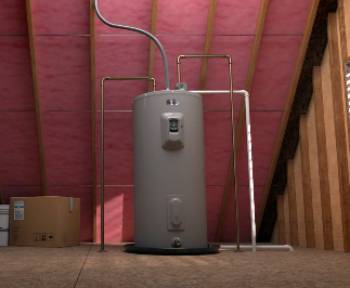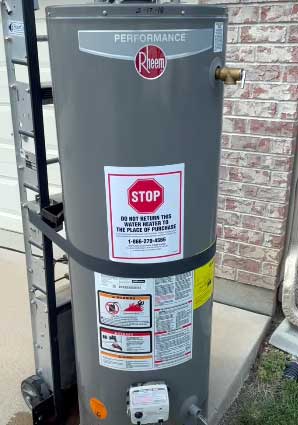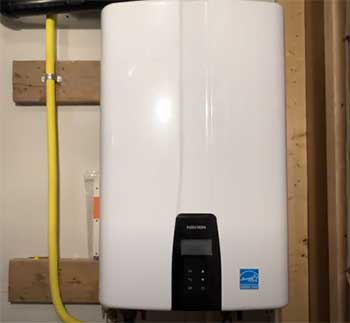If you’re looking for an energy-efficient, reliable, and stylish water heating solution, you’ve probably come across Richmond water heaters.
I’ve personally used one in my home, and this article is all about my experience with it, what you can expect, and how it stacks up against other major brands.
I’ll walk you through the highs, the lows, and everything in between to help you decide if it’s the right fit for your home.
My Experience with Richmond Water Heaters

When I first decided to replace my old water heater, I wanted something that offered consistent hot water without driving up my electricity bill.
After going through a list of recommendations and comparing energy ratings, I landed on the Richmond tankless electric water heater.
What attracted me initially was its promise of 99.8% energy efficiency and compact design.
I live in a moderate-sized home, and this unit was not just aesthetically pleasing—it was also incredibly easy to fit into a tight space.
The installation was a breeze, something I didn’t expect. My plumber finished setting it up in less than two hours, and I was impressed by how intuitive the digital temperature controls were.
What struck me first after turning it on was the immediate supply of hot water.
No delay. No fluctuation.
I could take long showers, wash dishes, and run laundry—sometimes all at once—and not once did I run out of hot water.
The digital control panel is very user-friendly. You can adjust the temperature by a single degree, anywhere between 80°F to 140°F, and see the setting on a clean display.
This gave me better control over how I used my water heating and saved me from overheating water unnecessarily.
One unexpected benefit? The reduction in my energy bills. Within two billing cycles, I noticed a clear drop compared to when I used my previous traditional heater.
The Richmond unit didn’t just meet my expectations—it exceeded them. I’m not saying it’s perfect, but the convenience, savings, and performance made it a great investment in my eyes.
I’ll admit, I was skeptical about the longevity and replacement parts.
But the copper immersion heating elements and brass tops gave me some confidence about durability. Plus, the elements are threaded and easy to replace, which means even if something does go wrong, it’s not the end of the world.
Up next: I’ll go through the pros and cons in detail.
Maintenance Tips for Richmond Water Heater

Regular maintenance is the key to ensuring your Richmond water heater continues working efficiently and reliably.
Based on my experience, here are the essential tips you’ll want to follow to keep your unit in great shape.
First and foremost, always keep an eye on the temperature setting. While the digital display is very accurate, I’ve made it a habit to double-check every couple of weeks to ensure it hasn’t been accidentally adjusted.
Keeping the temperature between 120°F and 125°F offers a sweet spot for both energy savings and household comfort.
Next, it’s essential to flush the system once or twice a year. Even though this is a tankless unit and not prone to sediment like traditional tanks, mineral buildup can still affect performance.
I typically run a vinegar solution through the system to dissolve any scale that forms on the heating elements. It’s a simple process that can be done in under an hour with a small circulation pump and some hoses.
Inspect the copper heating elements annually. The Richmond unit uses threaded immersion elements, which means you can unscrew and check them easily.
If there’s visible corrosion or scale buildup, replacing them is a cheap and quick fix. I swapped mine out after two years just to be proactive.
Clean the water inlet filter. This is something many people overlook. Sediment or debris from your plumbing can block the inlet and reduce water flow.
Unscrew the filter and rinse it under clean water every few months. It makes a noticeable difference in flow rate.
Check electrical connections occasionally. Although this part doesn’t usually cause trouble, it’s worth opening the panel and confirming that everything is tight and corrosion-free.
Loose wires or moisture damage can affect performance or even pose a safety hazard.
Make sure you’re using the unit within its rated flow capacity. If you notice water temperature fluctuating while multiple taps are running, you might be pushing the system too hard.
Either stagger water use or consider installing a second unit in high-demand homes.
Lastly, keep the unit’s exterior clean and dust-free. While it won’t affect performance much, dust buildup around the ventilation areas can raise internal temperatures. Just wipe it down with a dry cloth once a month and you’re good to go.
Following these basic maintenance steps has kept my unit working like new—and I’ve seen firsthand how skipping even one of them can lead to avoidable issues.
Pros and Cons of Richmond Water Heater

Pros:
- High Energy Efficiency: Richmond water heaters boast up to 99.8% energy efficiency. This means you’re not wasting electricity keeping a tank full of hot water all day. Instead, you heat water on demand, which helps cut down monthly energy bills significantly.
- On-Demand Hot Water: One of the biggest advantages is having continuous hot water when you need it. Whether I’m showering, running the dishwasher, or doing laundry, the temperature remains stable and responsive.
- Digital Temperature Control: The temperature can be adjusted in 1°F increments from 80°F to 140°F. This kind of precision lets you fine-tune your comfort level while also avoiding overheating.
- Compact and Stylish: The unit’s sleek, compact design fits neatly in tight utility rooms or even under cabinets. It’s a great fit for smaller homes or condos where space is a premium.
- Easy Installation: I didn’t expect this, but setup was simple. The water heater is straightforward for most licensed plumbers to install, and it comes with clear instructions.
- Durable Components: The copper immersion heating elements with brass tops increase the lifespan of the system and simplify repairs. They’re also threaded, so replacement doesn’t require specialized tools.
- Quiet Operation: Some heaters can be annoyingly loud when cycling. Richmond’s system operates quietly, barely noticeable during use.
Cons:
- Limited Flow for Larger Homes: If you have a big house with multiple simultaneous demands for hot water, a single unit might not keep up. It’s best suited for small to medium homes unless you install multiple units.
- No Wi-Fi Connectivity: While some modern heaters offer smart controls via apps, Richmond has not yet integrated smart home tech. That’s a letdown for those of us who love managing systems from our phones.
- Professional Installation Recommended: Although the system is easy to install for pros, it’s not DIY-friendly for beginners. If you’re not comfortable with plumbing and electrical work, you’ll need to hire help.
- Initial Cost: While you’ll save on energy bills long term, the upfront investment is higher than traditional tank water heaters. That can be a hurdle if you’re on a tight budget.
- Temperature Sensitivity: In colder climates, incoming water can sometimes require a longer heating time, especially if you’re trying to use multiple outlets at once.
- Occasional Maintenance: While low, the maintenance isn’t nonexistent. You’ll need to monitor the unit and occasionally replace parts like the heating element or temperature sensor if performance drops.
- No Backup During Power Outage: Since it’s an electric system, it won’t function during a power outage. That’s something to consider if your area experiences frequent blackouts.
Richmond Water Heater Vs. Other Brands
- Richmond Water Heater Vs. Rheem Water Heater

Having used both Richmond and Rheem units in different properties, I can confidently say they have more in common than most realize—mainly because Richmond is a sub-brand of Rheem. However, there are subtle differences worth mentioning.
Richmond heaters usually cost less, which makes them attractive for budget-conscious homeowners.
However, Rheem units offer more advanced features like Wi-Fi connectivity and mobile monitoring, which Richmond lacks. In terms of efficiency, both are on par, especially in their tankless models.
Still, I found Rheem slightly more refined in performance, particularly when managing multiple hot water demands simultaneously.
That said, if you’re looking for a simpler, more affordable option, Richmond still gets the job done with minimal compromise.
- Richmond Water Heater Vs. A.O. Smith Water Heater
When I compared my Richmond water heater with an A.O. Smith model installed at a friend’s place, the biggest difference was noise level and heat-up time.
A.O. Smith heaters tend to be a bit louder, especially when cycling. Richmond, in contrast, operates almost silently.
However, A.O. Smith units heat water faster during high-demand situations and come with more customization features.
From a durability standpoint, they’re fairly equal. But I found Richmond to be easier to maintain, thanks to its simple design and accessible parts.
A.O. Smith may suit those wanting higher-end features, but for quiet, consistent hot water, Richmond holds its ground.
- Richmond Water Heater Vs. Bosch Water Heater
Bosch water heaters are premium products known for their European engineering and compact design.
I installed one in a small studio I used to own and was impressed by its sleek appearance and near-instant heating.
That said, Bosch tends to be more expensive and sometimes requires adapters not included in the base package.
Richmond is more user-friendly and comes ready to install with fewer parts to buy separately. Richmond also wins in North American customer support and repair part availability.
If you value simplicity and affordability, Richmond is the better fit. But if you want design and brand prestige, Bosch might appeal more.
- Richmond Water Heater Vs. Navien Water Heater

Navien is another high-efficiency brand I considered before purchasing Richmond. What stopped me? Complexity and cost.
Navien units come with advanced features like recirculation pumps and smart sensors. But with those features comes a need for more technical knowledge or professional service. Richmond, by comparison, is straightforward.
It lacks the bells and whistles but makes up for it with ease of use and reliable performance. In terms of heating speed and capacity, Navien might edge ahead, especially in large homes.
But for standard daily use in small to mid-sized homes, Richmond proved more than sufficient without the steep price tag.
- Richmond Water Heater Vs. EcoSmart Water Heater
EcoSmart was my runner-up when I shopped around. It’s known for being energy-efficient and competitively priced.
However, many online reviews and friends warned me about reliability issues and inconsistent customer service. Richmond’s better build quality and solid warranty gave me peace of mind that EcoSmart didn’t offer.
While EcoSmart excels in eco-friendly features, Richmond’s consistent performance and easier maintenance ultimately made me feel more secure in my decision.
I’d recommend EcoSmart for those comfortable doing troubleshooting and repairs, but Richmond is the safer long-term investment for most households.
Frequently Asked Questions (FAQs)
Yes, Richmond water heaters are considered reliable and efficient, especially for the price. They’re backed by Rheem’s technology and often praised for their longevity and ease of use.
Richmond is a sub-brand of Rheem. While they share many components and technology, Richmond is generally more budget-friendly with slightly fewer premium features.
Brands like Rheem, A.O. Smith, and Bradford White are consistently rated among the most reliable. Richmond, being under Rheem, shares in that reliability but at a more affordable cost.
Yes, Richmond is owned and manufactured by Rheem, meaning it benefits from the same engineering, customer service, and manufacturing standards.
Final Thoughts
If you’re like me and want a water heater that works without fuss, doesn’t cost a fortune, and lasts for years, Richmond is a smart choice.
It’s efficient, easy to use, and backed by a trustworthy parent brand. You won’t get flashy tech, but you’ll get hot water when you need it, and that’s what matters most.
Don’t overpay for bells and whistles you’ll never use. Choose something dependable like Richmond — and enjoy peace of mind every time you turn on the tap.
